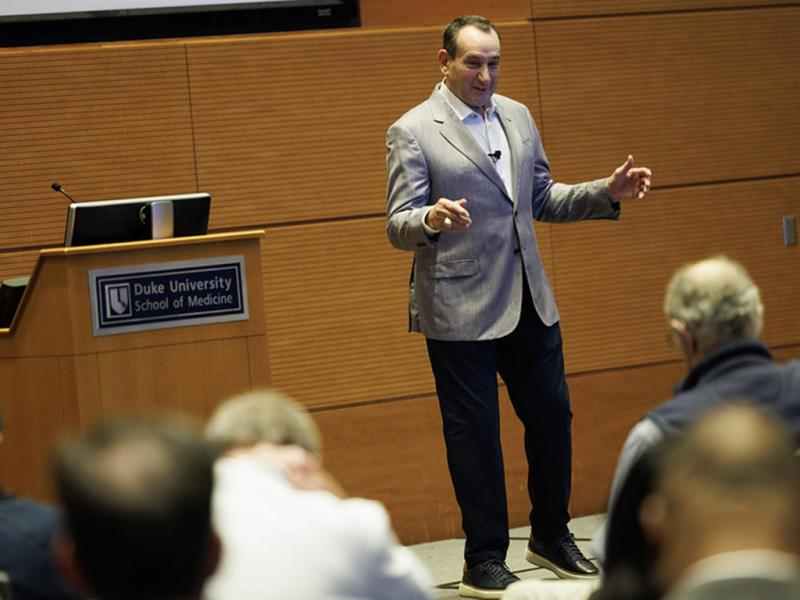
Addressing the Department of Medicine during a special Medicine Grand Rounds team meeting on Friday, October 3, legendary basketball coach Mike “Coach K” Krzyzewski urged the Duke internal medicine community to embrace adaptability, agility, accountability, and the collective power of teamwork in navigating adversity amid rapid change.
Drawing from his Hall of Fame career experiences off and on the court, Krzyzewski delivered a master class on leadership, resilience, and values with a simple but powerful key message: Have each other’s backs. Work as a team. Keep adapting. And when you get through tough times, you will be better as a result.
“Adversity is part of the gig,” he said, returning throughout the talk to his signature analogy for true teamwork — The Fist — where each finger represents a member of the team. The core lesson is that collective action, driven by shared goals and unified purpose, creates a force far greater than the sum of its parts. True teamwork requires members to put aside personal wants to focus on the team's common objective.
“Communication, trust, care, collective responsibility, and pride: That’s a fist, he said, ”Be a fist. You’ve got to be agile and adaptable. Have each other’s back. Go in as a fist. Keep preparing.”
No Excuses
Working as an effective, winning team, Krzyzewski said, means adopting a focused, solutions-oriented attitude, a mantra drilled into him at the age of 18 when, as a West Point cadet, he was permitted only three responses: "Yes, Sir," "No, Sir," and "No excuse, Sir."
“Failure is not a destination,” said Krzyzewski, who never lets his players talk to him with “palms up” hand gestures. “Something goes wrong? No excuses. Think about solutions.”
“I never let my players talk to me like that,” he said. Even if we lost, we’re still going to win. There’s no alternative. We’re going to get this done.”
Adversity is often the best teacher, Krzyzewski emphasized, speaking candidly about his own challenges and setbacks, including a 38-47 record after his third Duke season and calls for his dismissal. He overhauled his recruiting strategy, focused on building trust and relationships, and ultimately landed the nation’s top class — including Johnny Dawkins and Jay Bilas — an experience that ultimately fueled his own growth alongside that of the Duke brand.
Agility, Adaptability, and Accountability
Leadership matters most when times get tough, said Krzyzewski, who spent 42 seasons as head coach of the Blue Devils and continues, after more than 20 years, to teach at the Fuqua School of Business as a professor of the practice of leadership.
Effective leadership, he added, means being agile, willing to change course with shifting circumstances, and evolving alongside those one leads. It requires three key traits: agility, adaptability, and accountability.
Even at the height of his success in the mid-1990s and seven Final Fours in nine years, burnout forced the coach to step away from the bench for part of a season. He was a “bad leader,” he said, who delegated but did not empower his staff. His resulting change in course meant preparing others to lead in his stead.
Communicating and connecting with young athletes, meeting them where they are, over the years, is one area in which Krzyzewski said adaptability has served him well. Whether through music, cultural touchpoints, or remembering milestones — it builds trust and strengthens relationships.
“If you think you know everything as a leader, you’re wrong,” he said. “Your team knows things you don’t. Listening creates ownership.”
Krzyzewski also underscored the importance of accountability, not as punishment, but as a way to raise standards. He recalled a pivotal moment from his time coaching the U.S. men’s basketball team at the 2008 Olympics when he had to confront superstar Kobe Bryant for taking poor shots and hold him accountable.
“Accountability isn’t just when something goes wrong,” he said. “It’s also when something goes right. If you know something has to change and you don’t act, that’s on you.”
Values that Stand the Test of Time
In addressing team burnout, Krzyzewski said it has been important for him to lean on friends, family, and faith to help maintain a personal balance, which includes values.
“You don’t negotiate values,” he said, ticking off Duke’s values: Respect, Trust, Inclusion, Discovery, and Excellence. “Because when they go, you are not who you said you were or have been who you said you were. Those values stand the test of time. One of the reasons you’re sitting here is because you think Duke is a special place, and it is a special place because of what we do and what we believe.”
He closed with a reminder that success requires more than desire. “Everyone wants to win,” he said. “But not everyone wants to prepare to win. If you combine the will to win with the will to prepare, you become worthy of winning.”
His final words were simple and powerful. “It’s easy to lead when everything’s going well. But you’re going to face tough times — all of you. When you do, be a team. Have each other’s backs. Keep preparing. And you’ll be better for it. Because you’re damn good — and you’re going to get it done.”